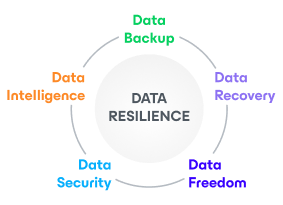Data backup and recovery strategies for cloud and SaaS workloads have become hot topics among businesses large and small. The thought process has changed from if to when companies will need to recover from some type of data loss, and with Salesforce being such an intricate part of hundreds of thousands of organizations, backing up your Salesforce data has now become a necessity. Download our new 9 Reasons for Salesforce Backup HERE.
While data loss is inevitable within an organization, whether it be through human error, integration error, or data breach, being proactive about data protection is the first step to avoiding disruptions.
Doesn’t Salesforce backup my data?
There tends to be confusion around what Salesforce is backing up, how it can be retrieved and how long it will take to restore it. Salesforce provides numerous native tools that can be used to back up your data. Most of these tools are manual and will only export your data, they will not restore in the event of data loss. The exception to this is Salesforce’s Backup & Restore tool, another key factor, is how accessible this backed up data is. For example, retrieving it involves a zip file full of CSV files, and restoring is manual and time-consuming. You also needed to proactively pull down these CSV files weekly, and many don’t realize that they NEED to take this step to recover their data until it’s too late.
What is Salesforce metadata and why is it important for backup?
Simplified, metadata is the data that provides information about other data. Here is an example of metadata in Salesforce. When an account is created, let’s call the account Pete’s Bicycles, that is data. The names of the fields such as the first name, and last name, that is metadata. As you can see, backing up data without metadata would be practically useless, as you not only lose critical data, but you also lose how it is connected to other data.
If a mistake is made, can’t we just find it in Salesforce and fix it?
With so many departments touching Salesforce within an organization, from the sales department to marketing department, to IT, it can be hard to discover where issues are coming from and if they are human error, integration, or data corruption. Larger organizations can have 100’s or 1000’s of Salesforce users (but data issues can just as easily happen in a small organization with fewer tech-specific employees) If you had 100 users, how long would it take to go through and manually fix an issue, and that is after the days or weeks it took to find it.
Also, Salesforce is a living, breathing database. This means everything is interconnected. When you restore, it is critical that you can properly stitch back together all these interconnections and that takes backup intelligence and application awareness.
Who should I ask in my organization if we are backing up Salesforce?
This is a question we are asked often, but unfortunately, there is no one answer. Depending on the size of your organization, you may have a Salesforce Admin (either in-house or contracted) but are they responsible for the backup? Or is it the Director of IT, the Backup Admin, or the Systems admin that should be responsible? This confusion is the reason that so many Salesforce org’s are not properly backed up.
Learn more about why Salesforce data is your responsibility and why you need to back it up in our newly released whitepaper 9 Reasons for Salesforce Backup.
Here are a few other things that might interest you:
- Register to be the first to know when Veeam Backup for Salesforce is available
- Download a Free e-book titled Salesforce Backup for Dummies
- Watch recordings from VeeamON 2022, including an on-demand Salesforce backup demo
